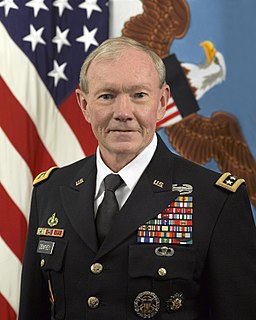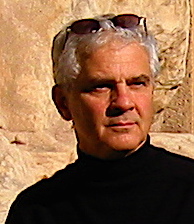A Quote by Martin Dempsey
Relieving the risk of a nuclear conflict with Iran diplomatically is superior than trying to do that militarily.
Related Quotes
Ultimately, only diplomacy can bring about a durable solution to the challenge posed by Iran's nuclear program. As President and Commander in Chief, I will do what is necessary to prevent Iran from obtaining a nuclear weapon. However, I have a profound responsibility to try to resolve our differences peacefully, rather than rush towards conflict.
When I came into office, the world was divided. Iran was resurgent. Iran is at its weakest point, economically, strategically, militarily, then since - then in many years. And we are going to continue to keep the pressure on to make sure that they do not get a nuclear weapon. That's in America's national interest and that will be the case so long as I'm president.
Iran's Supreme Court has issued a fatwa against the development of nuclear weapons. President [Hassan] Rouhani has indicated Iran will never develop nuclear weapons. I've made clear that we respect the right of the Iranian people to access peaceful nuclear energy in the context of Iran meeting its obligations.
As far as U.S. intelligence knows, Iran is developing nuclear capacities, but they don't know if they are trying to develop nuclear weapons or not. Chances are they're developing what's called 'nuclear capability,' which many states have. That is the ability to have nuclear weapons if they decide to do it. That's not a crime.
Congress has a limited role in regards to the nuclear agreement with Iran. We do have a review statute that was enacted into law where we review Iran's compliance with the agreement, and we have certain requirements on the President to keep us informed. What we have seen so far is that Iran is in compliance with the nuclear part of the agreement, but certainly has violated non-nuclear issues.
International inspectors are on the ground and Iran is being subjected to the most comprehensive, intrusive inspection regime ever negotiated to monitor a nuclear program. Inspectors will monitor Iran's key nuclear facilities 24 hours a day, 365 days a year. For decades to come, inspectors will have access to Iran's entire nuclear supply chain. In other words, if Iran tries to cheat - if they try to find build a bomb covertly, we will catch them.
We support any deal that denies Iran nuclear weapons, that has a continuous and robust inspection mechanism and that has snap-back provisions in case Iran violates the agreement. Our concern is that Iran will use the income it receives as a result of the lifting of the nuclear sanctions in order to fund its nefarious activities in the region.
































